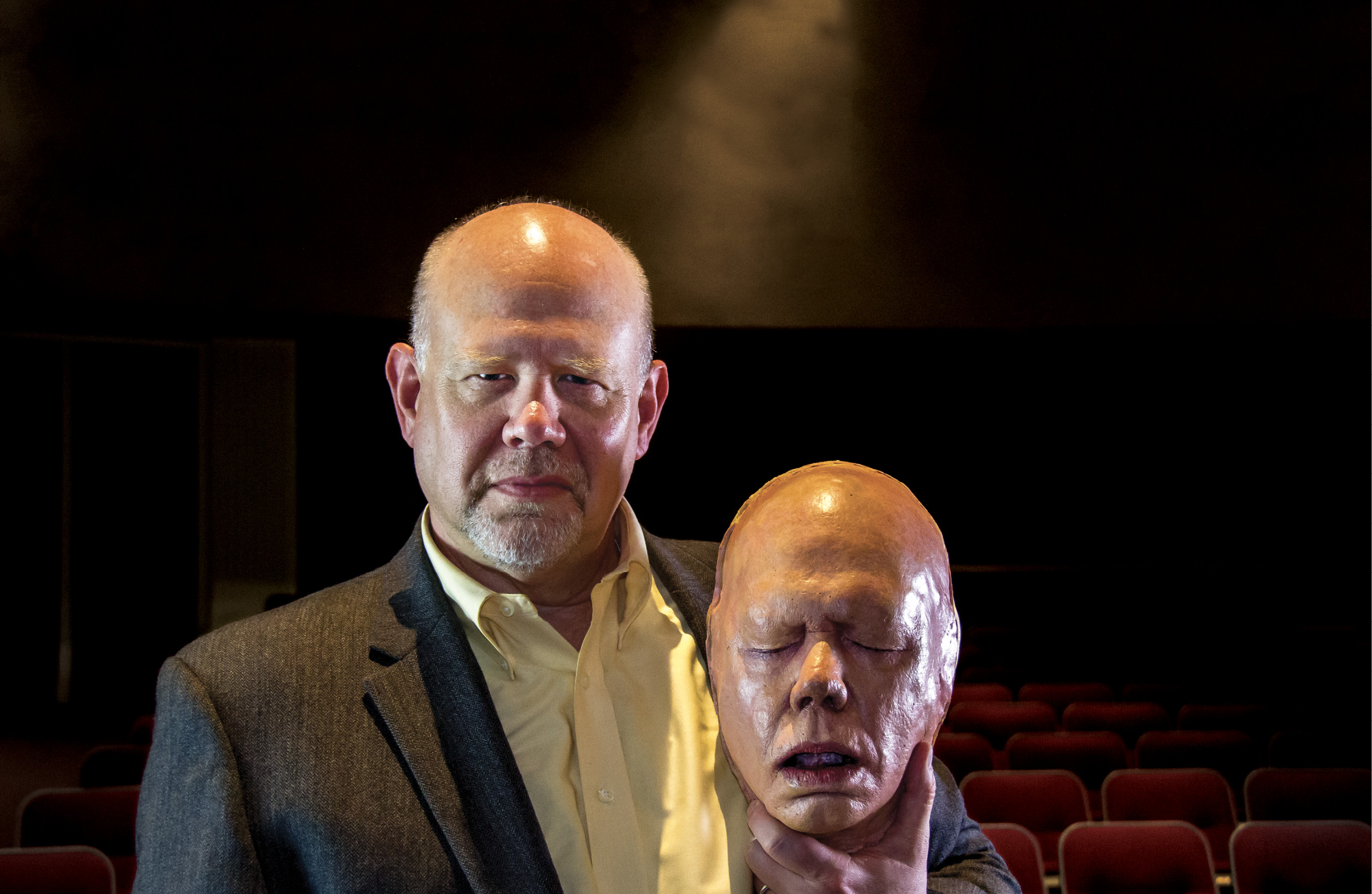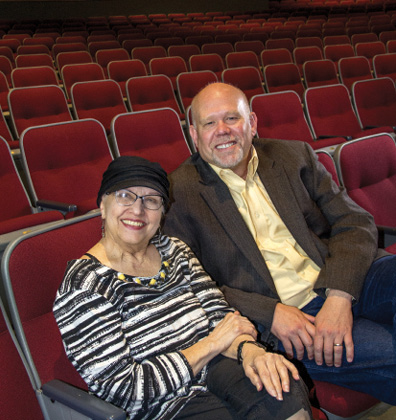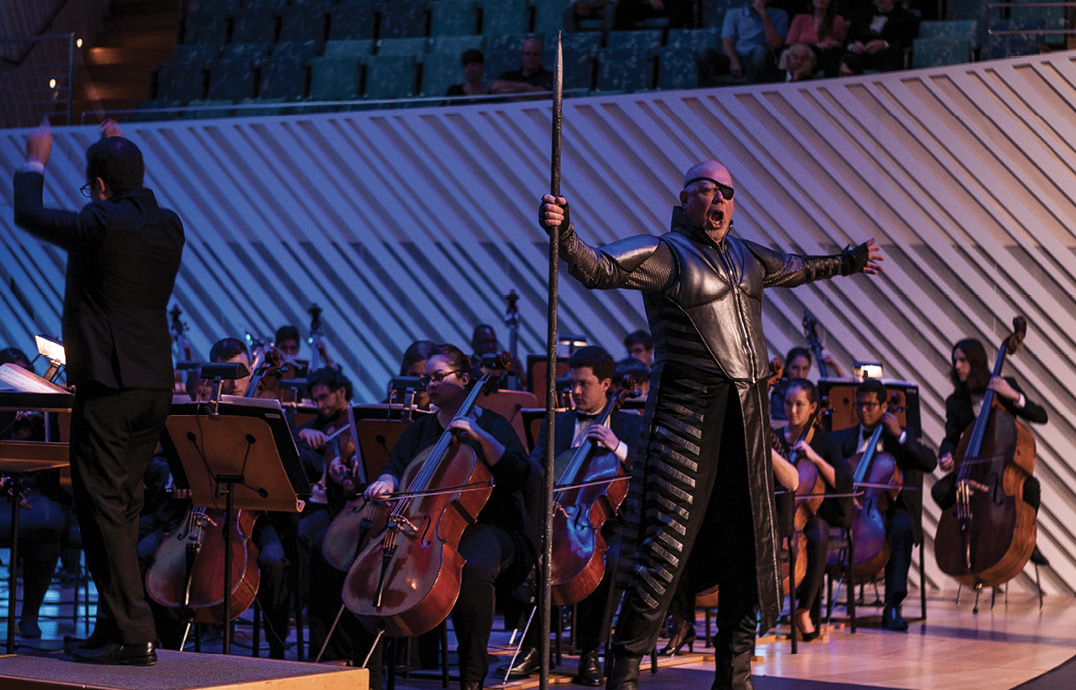
Alan J. Held ’83 won’t be adding his name to a long and impressive list of directors of opera at Wichita State when he takes over that post this fall. The list is impressive, all right. But not long: Robert Minser, Robert Mesrobian, George Gibson and Marie Allyn King, who took up the directorship back in 1997.
“When Marie King joined the faculty,” notes Rodney Miller, dean of the WSU College of Fine Arts, “everyone was excited to know that the reins of the opera program were being taken over by someone with significant professional experience to draw from. Marie did, indeed, draw upon that performing background to take the opera program to uncharted heights. Now we turn the program over to Alan Held, someone whose professional experience literally spans the globe and every major opera house in the world.”
As did a slew of other Wichita State graduates who’ve gone on to noted careers in the world of opera – including Samuel Ramey ’69 and Joyce DiDonato ’92 – Held started out planning to be a teacher. A native of small town Washburn, Ill., he was in his senior year at Millikin University in Decatur, Ill., when he met George Gibson, WSU Opera Theatre director who was teaching a master class at Millikin that year.
After Gibson heard Held sing, the WSU voice and opera professor recruited the Milliken music education major – who had begun his university studies focusing on the tuba, with piano as his second instrument – to Wichita State to continue his education. Gibson, a gifted vocal teacher with an ear for talent and a powerfully expressive bass-baritone voice of his own, sweetened the deal by offering Held a WSU assistantship, which he accepted and took on after graduating from Millikin in 1981.
“He was my mentor,” Held says of Gibson, who has lived in Tucson, Ariz, since retiring in 1997 after 30 years at WSU. “I was planning on going to the University of Iowa for graduate studies, but George said,” – and here Held, ever the performer, goes into the lowest register of his speaking voice to quote Gibson – “‘I think you should come to Wichita State.’ And I did!”
In 1983, after earning a master’s degree in music performance, Held joined the fine arts faculty as a lecturer in voice and the director of the University Chamber Singers. During his time at WSU, he appeared in seven operas, including in the faculty cast of Don Giovanni. “When we left in 1985,” Held says, “I told my wife that I wouldn’t be surprised if we came back here some day. It took 30 years, but we did.” Held and his wife Nancy, whom he met while at Millikin, celebrated 35 years together this past May. They have three sons and a daughter.
It was for the 2014 fall semester that Held returned to Wichita State as the Ann and Dennis Ross Faculty of Distinction in Opera. He has continued his active and acclaimed vocal career as one of the world’s most sought-after bass-baritone singing actors – while also attending to his on-campus roles as an associate professor.
“A heavy, projecting
instrument, that not only has a soaring top, but also
a smooth,
carrying middle and low register. The voice must be big, and have the ability to sound cruel, and yet have tremendous expansive ability.”
– Description from IPA Source of a voice that is categorized as a heldenbariton
“I always wanted to teach,” Held says, adding with a laugh: “The singing thing just got in the way – in kind of a nice way. But I love teaching. I love to see students light up when they realize they can do something. I love helping them discover what they can do. Staying involved with them, having to adjust on the fly because there’s a new group half the time – I think it makes you feel younger.”
King agrees. “Yes, oh absolutely! And every single one of them is different. They all have different needs, different personalities. You have to deal with them each in a different way. Hanging out with young people – that probably has been the saving grace of my 20 years here.”

During her tenure at WSU, King taught hundreds of students intent on learning the ropes of making a living as performers on the stages of musical and opera theatre.
She oversaw more than 30 productions, including favorites Candide, staged in 1999 and guest starring her friend and Music Theatre of Wichita’s artistic director Wayne Bryan in the role of Dr. Pangloss; Les Dialogues des Carmélites, a French opera written in 1953 and widely considered one of the best operas of the 20th century; and The Magic Flute, Mozart’s 1791 opera, which, King reports, “I set in outer space. That was a rock ’n roll show. I mean, we had such a good time with that one.”
Susannah – which featured in the role of preacher Olin Blitch one of the world’s foremost interpreters of bass and bass-baritone operatic repertoire, WSU alumnus Sam Ramey – and The Seven Deadly Sins are two more of King’s favorite Wichita State productions. There are more, of course, but not the space to list them all.
Just as impossible is coming up with a complete list of WSU students who made the transition to professional performers, whether they learned the basics during King’s time as director, or during earlier chapters of opera theatre at Wichita State.
J. Robert Minser ’50, a music education graduate of the University of Wichita, was the first director of an actual university entity called Opera Theatre. The 1951 Parnassus reports that Minser, who also directed the 35-member Women’s Glee Club, collaborated with George Wilner, the director of University Theatre, on the university’s production of two one-act operas: Mascagni’s Cavalleria Rusticana and Puccini’s Gianni Schicchi.
The second chapter of opera at WSU was directed by Robert Mesrobian, who in 1957 could have been seen performing as Baron and Prince Ivan in Candide on Broadway at the Martin Beck Theatre. After years of performing, including at the White House for President Johnson, Mesrobian moved into teaching. In 1966, under his direction, WSU Opera Theatre staged A Midsummer Night’s Dream in Duerksen Fine Arts Concert Hall, where, according to the 1966 Parnassus, there was “standing room only.”
King, too, tread the Broadway boards in her career prior to being enticed by the university and her friend Wayne Bryan to Wichita State. Two highlights: she was in Tintypes with Jerry Zaks and played Aldonza in Man of La Mancha opposite Ron Holgate. Described as a “force to be reckoned with,” King is set to move this summer to New York, where she and her husband have “a little house upstate,” she says. She wouldn’t mind ending up in New York City, but, she says, wherever she lands, “the plan is to go back and be an old actor, having been a young actor.”
Thinking back on her time at WSU, she believes that “one of the best things we do here is to really treat our students as individuals. The program is large enough to be competitive and stimulating, and small enough so we really get to know the students very well.”
Held thinks so too. “They get a lot of personal time with faculty,” he says. “We’re involved one-on-one with them. And they have so many opportunities to sing – to apply their learning – in productions here and throughout Wichita. At many universities, that doesn’t happen.”
King notes another special feature of the program: “We have orchestra for both of our major productions.” Held adds, “It’s amazing how rare that is these days. And the productions are done in the original tongue.”
Perhaps the most special, certainly the most unique, aspect of WSU’s program is its alumni, a veritable Shocker chorus of singular voices.

Alan Held, who served last summer as the principal master teacher
at the Miami Music Festival Wagner Institute, an elite young artists
program, performs as Wotan in featured excerpts from Wagner’s
Ring Cycle – including Act III of Die Walküre – at the New World
Center.
There are the superstars Ramey, DiDonato and Held, of course, but the truly remarkable thing is how many students have gone on to make their livings in this competitive business.
King and Held take turns naming alums; the list is long and includes three mezzo-sopranos, two tenors and a bass-baritone: Catherine Cook ’87, Carolyn Ramseur ’16, Danielle Rohr ’10, Aaron Short ’11, Brian Frutiger ’96 and Andrew Simpson ’14.
As Held looks ahead to taking up his new role as director this fall, he credits King with handing off a strong, well-led program.
“It’s obvious Marie has a deep commitment to her students,” he says. “She has such a great spirit with them in rehearsals. I just hope I don’t screw anything up!”
“It’s been a joy,” King responds. “Alan’s at the top of his career, and I’m looking forward to the enhanced professional perspective that he brings from his years on the international scene to the students in the program. He has a huge breadth of knowledge. He’s incredibly kind, but also tough. He knows what to teach our students to focus on if they want to work – and he’s not afraid to get out there and be the face of the program.”
Although the university had staged operas as early as 1941 as collaborations of the speech and music departments, Held will be only the fifth to hold an opera directorship at Wichita State.
Known especially for his extraordinary ability to meld the operatic character he’s playing with the music he’s singing, he’s recognized world-wide as one of today’s leading singing actors. He is a recipient of many honors and awards, including the 1991 Birgit Nilsson Prize.
His ringing baritone and commanding six-foot-five presence (yes, he did play basketball, and yes, he’s a huge Shocker hoops fan) early on caught the admiration of the Wolf Trap Opera Company and the Washington Opera, both in D.C., but the world’s leading opera houses soon became his stage, and have been for 30 years now.
Through the years, Held has sung just about every kind of music, including country. But there’s a particular operatic voice type for which he’s most renowned: the German dramatic baritone, essentially a bass with a high register, associated with the operas of Richard Wagner and called heldenbariton, the “heroic” baritone. He’s so known for this, in fact, that if you look up “The Helden Baritone” on YouTube, you’ll find a clip of Alan J. Held.





